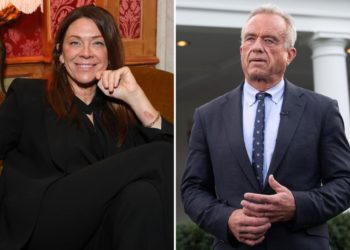When President Trump picked up the phone on June 17 to speak with Prime Minister Narendra Modi of India, he expected the conversation to showcase his command of personal diplomacy. Instead, it unraveled into a rupture. Mr. Trump boasted of having “solved” the conflict between India and Pakistan — and suggested that Pakistan was going to nominate him for the Nobel Peace Prize. Mr. Modi bristled.
Within weeks, Mr. Trump had slapped 50 percent tariffs on Indian exports, and Mr. Modi was literally holding hands with the leaders of Russia and China. It could end in a realignment that would undermine decades of careful American courtship, from President Bill Clinton’s groundbreaking 2000 visit to President George W. Bush’s landmark civil nuclear deal.
This is the danger of overpersonalizing foreign policy. While diplomacy has always contained a human element — and yes, some degree of flattery — when the chemistry between leaders becomes a substitute for a coherent strategy, international relations become more volatile and less predictable.
We know this firsthand. One of us is a former secretary of state; the other, a scholar of the psychology of leaders and crisis decision-making. Together we teach a course at Columbia, Inside the Situation Room, where we highlight the human element in foreign policy and the risks and blind spots that emerge when leaders try to gauge the intentions of their adversaries and the threats they pose. This human dimension is both the focus of a growing body of scholarship and something practitioners have long grasped intuitively. Insights from both communities have shaped our teaching and led us to edit a book on the subject.
We study and teach how leaders navigate ambiguity in an uncertain world. Every day their inboxes are flooded with cables, memos, intelligence assessments and advice. Separating signals from noise is one of their most urgent and most difficult tasks.
Personal relationships seem to cut through the fog. When leaders meet face-to-face, they believe they can see the “real” person across the table and pick up on nonverbal signals, such as body language and tone of voice, that cannot easily be faked. Political leaders like to lean on their intuition and skills that served them on the campaign trail, such as reading a crowd or sensing weakness.
This kind of personal diplomacy can be powerful, but it can also be an illusion. Leaders often feel they are getting unfiltered access when, in fact, they are witnessing carefully choreographed theater.
Social psychology helps explain why such performances nevertheless work: Vivid, emotionally charged encounters tend to eclipse more objective analysis. Daniel Kahneman and Amos Tversky showed how dramatic moments — a tense phone call, an intimate dinner, a handshake at a summit — loom larger in one’s memory than cables or data. Neuroscience adds another layer: Mirror neurons fire when we lock eyes with another human being, producing a sense of connection that can be genuine but also misleading. In this way, foreign policy can resemble a game of poker, with players trying to read one another’s hands through body language.
Employing personal diplomacy to assess the intentions and resolve of adversaries has a long history. President John F. Kennedy left his Vienna meeting with Nikita Khrushchev in 1961 shaken, believing he had been outmatched. The Soviets read his unease as weakness and went on to press Kennedy harder in Berlin and later in Cuba. Mr. Bush claimed to have looked into the eyes of President Vladimir Putin of Russia and seen his soul, a positive assessment that aged poorly as Russia tightened its grip on its neighbors and crushed dissent. Even President Franklin D. Roosevelt, a master politician, misread Joseph Stalin at Yalta, trusting his personal assurances while Eastern Europe slipped behind the Iron Curtain.
Even episodes of success reveal the limits of personal rapport. President Jimmy Carter invested extraordinary personal energy and political capital at Camp David, producing a lasting peace between Israel and Egypt. Mr. Carter hoped the same formula could resolve the Palestinian question. It did not. The larger Middle East remained turbulent. Over 20 years later, Mr. Clinton worked hard to build a personal rapport between the Palestinian and Israeli leaders Yasir Arafat and Ehud Barak at Camp David in 2000. The summit ultimately failed after Mr. Arafat reneged on the personal assurances he gave to Mr. Clinton that he would sign the accord. Personality can open doors, but it cannot rewrite geopolitics and a long history of conflict.
Now and then, personal diplomacy has produced breakthroughs that changed the course of history. Ronald Reagan’s affinity with the new Soviet leader Mikhail Gorbachev, which was evident from their first encounter in Geneva, made nuclear arms control imaginable. But the arms control treaties penned in this era succeeded because they were embedded in verification regimes and mutual interests, not personal chemistry alone. It was Mr. Reagan, after all, who notably said, “Trust but verify.”
Other presidents have taken personalization in a different direction. For instance, rather than appearing warm or trustworthy, Richard Nixon tried to weaponize unpredictability, drawing on Thomas Schelling’s concept of the “rationality of irrationality,” or what later came to be known as the “madman theory.” If adversaries believed he was volatile enough to do anything, even launch nuclear strikes, they might think twice before crossing him. In October 1969, Nixon put the theory to the test with a global nuclear alert. American bombers were quietly placed on heightened readiness, and signals were leaked in ways meant to unnerve Moscow and Hanoi. The gambit backfired: The Soviets barely budged and allies were alarmed that the U.S. nuclear posture was being manipulated as a psychological ploy.
The current president has injected his own brand of volatility and uncertainty back into U.S. foreign policy. Neither our allies nor our adversaries can tell whether his praise of tyrants is a calculated game of tactical empathy or genuine conviction, raising the risk of dangerous miscalculation.
Which raises the question: Does Mr. Trump view personal chemistry with foreign leaders as helping his strategy or a substitute for having one? In his own words, he “fell in love” with Kim Jong-un, brandishing their letters as proof of progress even as North Korea expanded its nuclear arsenal. His cultivation of Gulf leaders helped pave the way for the Abraham Accords, his signature diplomatic achievement, which offered hope of reshaping the Middle East. Those hopes seem distant now that Mr. Trump’s personal relationship with Prime Minister Benjamin Netanyahu of Israel was not enough to restrain the recent Israeli attack on Hamas leaders in Qatar that enraged Arab leaders. Mr. Trump has also invested significantly in his personal relationship with Mr. Putin, but that has not helped end the war in Ukraine or prevent Russian drones from entering Poland, a NATO ally.
Leader-to-leader engagement can break deadlocks that bureaucracies cannot, but the overpersonalization of foreign policy risks distorting judgment and magnifying volatility.
America’s institutions exist to prevent this kind of misjudgment. The State Department, the intelligence community and even NATO are not shackles on American interests, but the scaffolding that ensures them. Harry Truman tied American power to NATO so that trans-Atlantic defense would last beyond any one administration. George H.W. Bush built the gulf war coalition around rule of law and multilateralism, and Joe Biden relied on the wisdom of his intelligence officials to preemptively reveal Russian intentions to invade Ukraine.
Institutions matter not only because they provide continuity across administrations, but also because they house individuals with deep expertise and long memory — people who have spent careers studying adversaries, allies and the patterns of international politics. They are in the room for a reason. Their role is to test assumptions, bring perspective and ensure that decisions are grounded in national security interests rather than emotion alone.
When leaders let emotions or personal chemistry determine their policy, volatility replaces credibility with both adversaries and allies alike.
Hillary Rodham Clinton is a former secretary of state and United States senator and was the Democratic nominee for president in 2016. Keren Yarhi-Milo is the dean of Columbia University’s School of International and Public Affairs and the Adlai E. Stevenson Professor of International Relations. They are the editors of “Inside the Situation Room: The Theory and Practice of Crisis Decision-making.”
Source photographs by Pool, Win McNamee, Saul Loeb, Drew Angerer, Scott Olson, Mark Wilson and Brendan Smialowski/Getty Images
The Times is committed to publishing a diversity of letters to the editor. We’d like to hear what you think about this or any of our articles. Here are some tips. And here’s our email: [email protected].
Follow the New York Times Opinion section on Facebook, Instagram, TikTok, Bluesky, WhatsApp and Threads.
The post The Perils of Getting Too Personal in Foreign Policy appeared first on New York Times.




